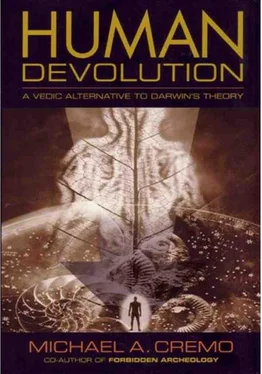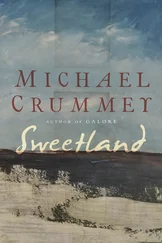Michael Cremo - Human Devolution - A Vedic Alternative To Darwin's Theory
Здесь есть возможность читать онлайн «Michael Cremo - Human Devolution - A Vedic Alternative To Darwin's Theory» весь текст электронной книги совершенно бесплатно (целиком полную версию без сокращений). В некоторых случаях можно слушать аудио, скачать через торрент в формате fb2 и присутствует краткое содержание. Год выпуска: 2003, ISBN: 2003, Издательство: Torchlight Publishing, Жанр: Старинная литература, на английском языке. Описание произведения, (предисловие) а так же отзывы посетителей доступны на портале библиотеки ЛибКат.
- Название:Human Devolution: A Vedic Alternative To Darwin's Theory
- Автор:
- Издательство:Torchlight Publishing
- Жанр:
- Год:2003
- ISBN:9780892133345
- Рейтинг книги:4 / 5. Голосов: 1
-
Избранное:Добавить в избранное
- Отзывы:
-
Ваша оценка:
- 80
- 1
- 2
- 3
- 4
- 5
Human Devolution: A Vedic Alternative To Darwin's Theory: краткое содержание, описание и аннотация
Предлагаем к чтению аннотацию, описание, краткое содержание или предисловие (зависит от того, что написал сам автор книги «Human Devolution: A Vedic Alternative To Darwin's Theory»). Если вы не нашли необходимую информацию о книге — напишите в комментариях, мы постараемся отыскать её.
Human Devolution: A Vedic Alternative To Darwin's Theory — читать онлайн бесплатно полную книгу (весь текст) целиком
Ниже представлен текст книги, разбитый по страницам. Система сохранения места последней прочитанной страницы, позволяет с удобством читать онлайн бесплатно книгу «Human Devolution: A Vedic Alternative To Darwin's Theory», без необходимости каждый раз заново искать на чём Вы остановились. Поставьте закладку, и сможете в любой момент перейти на страницу, на которой закончили чтение.
Интервал:
Закладка:
The director of the Çatalhöyük site is archeologist Ian Hodder, of Cambridge University in England. While some members of the orthodox archeological establishment are striving to maintain their exclusive authority and control over the process of picturing the past for the rest of society, some few archeologists, such as Hodder, are starting to take notice of the evolving situation represented by personalities such as the goddess worshipers and this forbidden archeologist, with his roots in the ancient Vedic tradition of India. In a perceptive article in antiquity, Hodder (1997, p. 699) wrote: “Day by day it becomes more difficult to argue for a past controlled by the academy. The proliferation of special interests on the ‘fringe’ increasingly challenges, or spreads to, the dominant discourse itself.” The forbidden archeology phenomenon has done both. Over the past few years, I have certainly been working to challenge the “dominant discourse.” Indeed, through my presentations at mainstream archeological conferences, sometimes resulting in my papers appearing in otherwise orthodox professional academic publications, the challenge has in fact spread into the realm of the dominant discourse itself. Of course, this is not just true of me and my work, but of that of many others working in the fields of alternative history and archeology. Hodder (1997, p. 699) took notice of the alternative knowledge communities springing up on the web, acknowledging that “many are extremely well informed.” He then said that “it is no longer so easy to see who is ‘in’ the academy and who is ‘outside’” (1997, p. 700). Hodder was instrumental in involving New Age goddess worshipers and ecofeminists in the ongoing exploration and development of the Çatalhöyük site. Hopefully, things will continue to progress in this direction, with academy-trained archeologists and well-informed representatives of alternative wisdom traditions cooperating to produce new ways of understanding the past. Hodder (1997, p. 694) cited efforts by North American archeologists to “work together with native Americans and integrate the use of oral traditions in archeological interpretation.” The American archeologists involved in one such effort (Anyon et al. 1996, p. 15) said that it shows “scientific knowledge does not constitute a privileged view of the past . . . it is simply another way of knowing the past.” My own effort has focused on bringing the spiritual cosmology of ancient India into mainstream archeological discourse, thus contributing to our understanding of human origins.
Human Devolution and Cosmology
The human devolution concept can only be understood in the context of a spiritual cosmology, involving levels of matter, mind and spirit. In the first part of this chapter, I will review some of the expressions of spiritual cosmologies in the West, from the time of the Greeks and Romans to the time of Newton. In this way, I hope to provide any new spiritual cosmology that may rise to prominence in the West with a cultural pedigree, and also the heritage of a longstanding and substantial evidential foundation.
In the second part of this chapter, I will demonstrate that spiritual cosmologies, greatly resembling those that were once dominant in the West can be found in many other times and places in the world’s history. The demonstration will be based upon reports of traditional beliefs of non-Western peoples gathered over the past two centuries by social scientists and scholars of comparative religion. Such scientists and scholars have advanced various theories about the origin and function of spiritual cosmologies, differing greatly in their conclusions. It is not, however, my purpose to disentangle the history of their agreements and disagreements, but rather to point out that in the course of their presentations they bring to our attention a wealth of detailed observations confirming that the overwhelming majority of peoples and cultures on this planet have accepted, and still accept today, spiritual cosmologies.
My demonstration will take the form of soundings or test bores, spaced (or timed) widely and somewhat randomly. If we propose that there is an underground deposit of a certain kind of ore extended through a certain region, we may execute several widely spaced test drillings, and if all the test drillings over this particular region show the presence of that ore, then we may safely conclude our initial proposal is probably correct. Now to determine the exact boundaries of the ore deposit, horizontally and vertically, and the concentration and purity of the ore at different places, will take a much more intensive systematic mapping effort. But the initial test results will have justified that endeavor.
One problem with our cosmological test drillings is that the terminologies and conceptualizations of various historical cosmologies, although bearing a family resemblance, are somewhat different. This is to be expected, but for the purposes of analyzing the relationships among the members of this set of cosmologies, I wish to introduce a template cosmology against which the terminologies and conceptualizations of the
250 Human Devolution: a vedic alternative to Darwin’s theory
others can be measured and compared, much as various world currencies are measured against the dollar. Actually, the currencies are separate, and have their roots in distinct economies; yet, there is a practical need for translation of one currency into another, and for this purpose, some standard of comparison has to be chosen. For this purpose, I am adopting a cosmological structure from the ancient Sanskrit writings of India. This, of course, reflects my own personal preferences as well as my belief that the cosmology expressed in the Sanskrit writings is objectively best suited for this purpose. I characterize the Indian Sanskrit writings as “Vedic,” using the widest interpretation of the term to include not only the four original Vedas, but also the supplementary Vedic literatures such as the Puranas.
A template Spiritual Cosmology
A clear expression of a template model of a mystical cosmology is found in chapters 25–29 of the Fourth Canto of the Shrimad Bhagavatam, also known as the Bhagavata Purana. These chapters present an elaborate cosmological allegory called “The City of Nine Gates.” The sophistication of the allegory and the potential explanatory power of its elements invite modern researchers to consider alternatives to materialistic cosmologies.
The account of the City of Nine Gates is specifically identified as allegorical in the Shrimad Bhagavatam itself. The account was spoken by the sage Narada Muni, who was questioned by King Prachinabarhishat about the nature of the self, and Narada Muni himself explained all the elements of the allegory in the original text. In other words, it is not that I myself have identified some passages from the Bhagavata Purana as allegorical, and myself interpreted the passage in terms of a spiritual cosmology. The allegorical nature of the passages and their application to a spiritual cosmology are features of the text itself.
The central character in the allegory of the City of Nine Gates is a King named Puranjana. One meaning of the Sanskrit word puran-jana in the context of the allegory is “one who enjoys in a body.” Soul/body dualism is thus hinted at in the King’s name. King Puranjana originally existed as a spirit soul in a purely spiritual realm in relationship with a supreme conscious being, God. Materialists may oppose the introduction of this transcendental realm, which exists outside the material universe knowable by science. But even the materialist cosmology of modern science sometimes incorporates a “transcendental” realm, that is to say, a realm that exists beyond the universe knowable by the traditional methods of modern science, and from which that universe emerged at the time of the Big Bang. This transcendental reality, existing beyond time, space, and matter, is called the quantum mechanical vacuum, and is pictured as a pure energy field in which particles appear and instantly disappear. From this sea of virtual particles, some go through a process of expansion that keeps them in existence. According to many cosmologists, our universe is the outcome of one such expansion.
Читать дальшеИнтервал:
Закладка:
Похожие книги на «Human Devolution: A Vedic Alternative To Darwin's Theory»
Представляем Вашему вниманию похожие книги на «Human Devolution: A Vedic Alternative To Darwin's Theory» списком для выбора. Мы отобрали схожую по названию и смыслу литературу в надежде предоставить читателям больше вариантов отыскать новые, интересные, ещё непрочитанные произведения.
Обсуждение, отзывы о книге «Human Devolution: A Vedic Alternative To Darwin's Theory» и просто собственные мнения читателей. Оставьте ваши комментарии, напишите, что Вы думаете о произведении, его смысле или главных героях. Укажите что конкретно понравилось, а что нет, и почему Вы так считаете.












